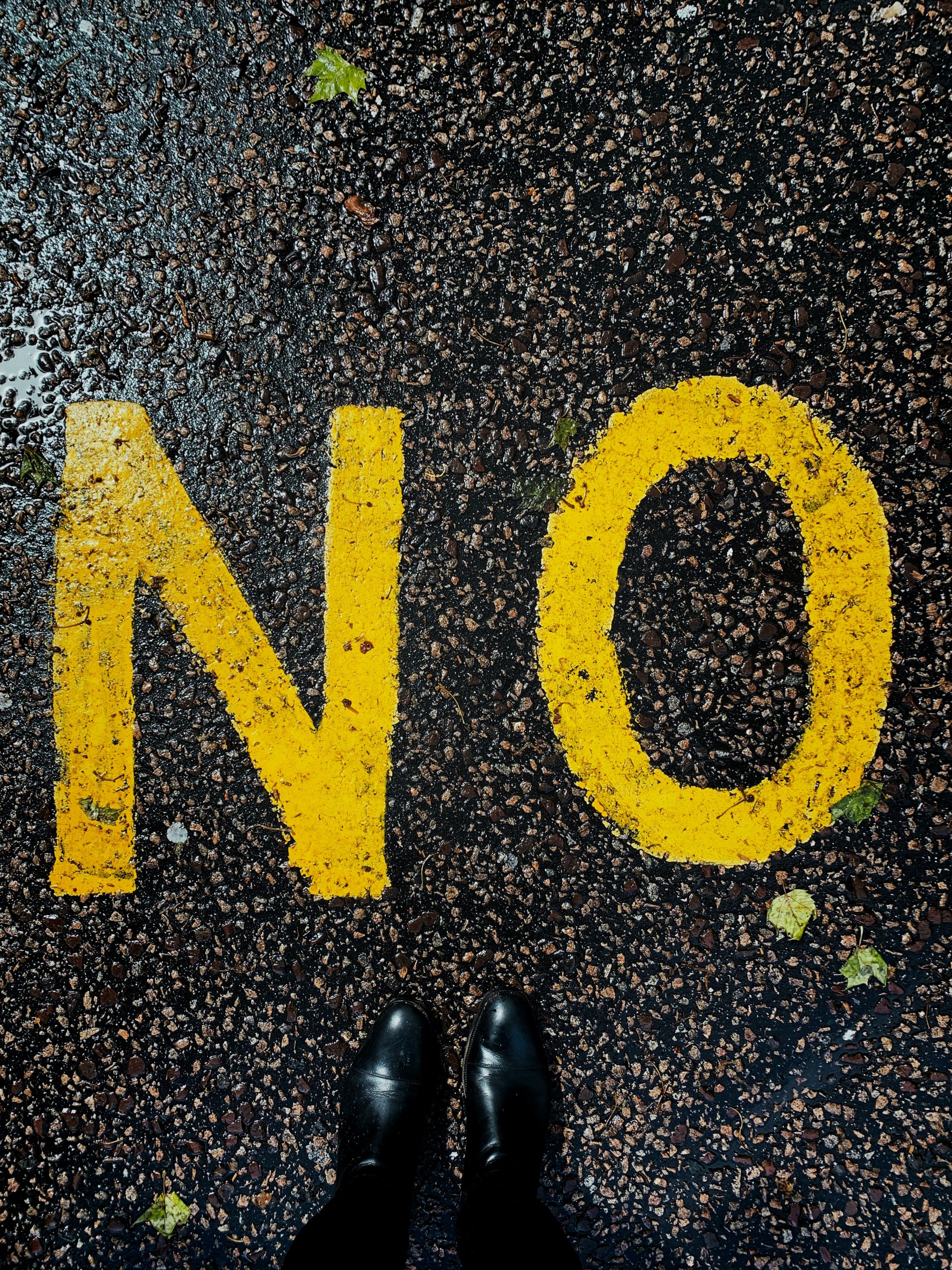How difficult is it for you to say “No”? In which situations is it particularly difficult for you?
When a friend wants a favor?
When you are asked to take on new tasks at work even though you are already working overtime?
When someone offers you an exciting project but you really want to spend more time with your family?
Or if everyone on your team says “Yes” to an idea, then to say “No”?
For me it’s particularly difficult to say “No” when it comes to my inner circle.
To say “No” to go to an onsite family celebration as long as contact restrictions are recommended due to Covid.
To say “No” to a good friend to join him at the Oktoberfest.
To tell my sister that I don’t want to speak to her psychologist again.
What makes is it so difficult for us to say “No” oftentimes?
We don’t want to disappoint other people’s expectations. Especially, when what we say “No” to is very important to the other person.
We are scared of being rejected and of looking stupid.
We are afraid what others might think.
We fear to get others in trouble.
We fear to spoil the good vibes in the group.
A lot of inner critics who show up here!
And if we do manage to say “No” in a difficult situation, we feel guilty and doubts like “Shouldn’t I have said “Yes”?” show up. Then, we are stuck in this thought loop and feel bad about it for a long time.
Many times we therefore don’t say “No” and pay the price!
“Opportunity costs” if you will.
When we say “Yes” to things that we actually want to say “No” to, we don’t have the time and energy to do the things we really want to do.
We also pay the price of our integrity.
We don’t do what is important to us but what is important to others. We do not live our own values but the values of others. We may even “betray” our values. This has in impact on our self-confidence. We are disappointed with ourselves or angry.
It doesn’t have to be that way!
We can learn to say “No”.
We can free ourselves from what others might think.
We can overcome our fears and worries.
We can leave behind our bad conscience.
How?
What can help you say “No”? And be free?
Maybe these 5 tips will grow your courage to say “No”.
Tip 1: Catch the Chatter!
Become aware of your thoughts!
Especially when it comes to topics and situations in which it is difficult for you to say “No” or to draw boundaries. (cf. Emiliya Zhivotovskaya, 20 Body & Mind Tools to overcome Anxiety)
How does it work?
- Pause, ask yourself “What am I thinking?”
- Write down all thoughts and voices that show up.
- Identify: Who supports or limits me, which parts show up?
- Introduce a structure that reminds you to pause again and again (set an alarm clock or place a post-it on your computer!)
- Do this regularly, e.g. 1 x day for several weeks
Tip 2: Seperate yourself from your thoughts
The voices and thoughts that show up when you want to say “No” are only parts of you – like several “sticky notes”. You as “I” decide which thoughts you want to listen to.
How?
- Separate
the “I” from your thoughts & feelings
> Say “a part of me is afraid” instead of “I am afraid” or “a part of me doesn’t want to disappoint others” instead of “I disappoint others”.
- Decide who you want to listen to!
> Imagine that you are the CEO of a company and you enter a conference room. All your thoughts are like employees at the conference table. They all have their expertise and inform you about their opinion. You listen to everyone and then decide who you want to listen to. Because: You have the choice! You can also listen to the brave voice in you!
Tip 3: Team up with your Inner Superpowers!
You have many supportive inner resources and strengths that can help you say “No”, such as the courageous or the wise part in you (your future self) or strengths such as the determined, the problem solver, the observer.
They are your Superpowers and you can consciously “tap” into them and use them any time. (cf. Cynthia Loy Darst, Meet Your Inside Team)
4 Steps:
- Collect: What are the inner resources that best support you in saying “No”!
- Characterize them like movie characters and have them be your support crew! (Eagle – the Observer, Buddha – the Centered, Yoda – the Wise)
- Make them as alive and vivid as possible!
- Practice getting in touch with your team members!
If you want to go deeper here, take part in my Online Workshop “Inner Strength & Courage”. Here we do exactly that: we activate and characterise your Inner Superpowers.

Tipp 4: Say „No“ positively
Saying “No” positively means saying „No“ in a clear and definite way while maintaining a positive connection. (cf. William Ury, The Power of a Positive No)
This is how it works in 3 steps:
- Receive: Receive the request so that your counterpart realizes that you take her seriously and acknowledge its importance!
- Say “No”: Say “No” clearly and explain why and what is important to you about it
- Open: Offer something constructive, a way forward for the request
For example, if a friend from your network asks you to support him with a project, you could say “No” in a positive way like this:
I am very happy that you ask me to be part of the project and appreciate your trust in me.
I am very busy with my projects and I want to spend the free time I have with my family.
Therefore I will not support you in your project.
Since I find your project really inspiring, I would be happy to pass your request on to a colleague who might be a good fit.
Tip 5: Confirm your courage with a mantra!
A confirmation mantra is a mantra that you say to yourself after you have bravely drawn boundaries. A mantra could be
When I say “No” I stay true to myself!
Saying “No” makes me confident!
It helps you to feel less “selfish” and motivates you to keep saying „No“ more often. (cf. tinybuddha.com, How to set boundaries: 9 Tips for People-Pleasers)
How does it work?
- Come up with a mantra and write it down!
- Visualize it & have it in sight (e.g. as a screen saver on your phone)!
- Say it to yourself every time you say “No” or draw boundaries!
What else?
Try out different strategies to say “No” and find out what works best for you.
Practice them on a regular basis so that they work even in difficult situations! And don’t be upset, if you fail sometimes. It’s normal!
If you want to learn more about the tips in this article, have a look at my WEBINAR on “Say No – without fear”.
Just imagine … if from now on you would always say “No” when you mean “No”?
And “Yes” to what is important to you?
Then, what is possible?
To find out more about this version of your future, be there at my Vision (Board) Online Workshop and prototype it.
Literature
- Emiliya Zhivotovskaya, 20 Body & Mind Tools to overcome Anxiety, https://theflourishingcenter.com/20tools/
- How to set boundaries:9 Tips for People-Pleasers, https://tinybuddha.com/blog/how-to-set-better-boundaries-9-tips-for-people-pleasers/
- William Ury, The Power of a Positive No, https://www.youtube.com/watch?v=OvrW-jTVCvE
- Cynthia Loy Darst, Meet Your Inside Team: How to Turn Internal Conflict into Clarity and Move Forward with Your Life, 2018
